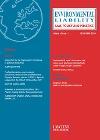Environmental Liability - Law, Policy and Practice - Volume 28 - Issue 1

Articles
Global Pact for the Environment: from treaty to political declaration
ALEXIOS ANTYPAS
Central European University
The purpose of the Global Pact for the Environment (GPE) is to establish core universal principles of environmental law that would be normative in all sectors and would not depend on specialised treaties for specific sectors and issues. The author discusses these principles in two categories – substantive and procedural – and concludes that the GPE, while less than the treaty that was originally envisioned, is ambitious and conceptually robust. It is likely to be a valuable resource for the development of international environmental law and the strengthening of the institutional framework to implement it
Final authorisations, environmental assessment, compensation and the Habitats Directive. Remarks on Case C–278/21, Aqua Pri, judgment of the CJEU of 10 November 2022
AGUSTÍN GARCÍA-URETA
University of the Basque Country, Bilbao
The judgment under discussion goes beyond the question of ‘appropriate’ environmental impact assessment (EIA) of projects with significant effects on Natura 2000 sites, as it also considers general questions of administrative law in the EU Member States. In Aqua Pria fish farm sought a new authorisation, that was subject to a new EIA under Article 6(3) of the Habitats Directive, in order to continue a previously authorised activity. The judgment makes clear that the failure to consider the effects of the project together with other similar nearby projects, constituted a relevant breach of the Habitats Directive
Reviewing science-based decisions: CWS Powder Coatings GmbH v European Commission
ALEKSANDRA CAVOŠKI, LAURA HOLDEN and ROBERT LEE
University of Birmingham
This ruling from the EU General Court, which annulled a delegated regulation of the European Commission demanding the harmonised classification and labelling of titanium dioxide as a carcinogen, raises significant questions regarding the extent of the court’s role in reviewing science-based decisions. The Commission has appealed the decision, with the concept of manifest error at the heart of its appeal
Case Commentary
Environmental impact assessment and urban areas:
Wertinvest Hotelbetriebs GmbH v Magistrat der Stadt Wien
AGUSTÍN GARCÍA-URETA
University of the Basque Country, Bilbao
A succession of cases before the CJEU have revealed that Member States’ legislation still does not fully comply with the EIA Directive. The Wertinvest Hotelbetriebs case demonstrates a lack of compliance despite well established judicial criteria in interpreting the Directive, and the author argues that after 35 years a thorough pan-European review of projects that should be subject to an EIA is now needed
UK News
Electro-fishing prosecution
Current Survey
European Union
MARTIN HEDEMANN-ROBINSON
University of Kent, Canterbury
Marine Environment
Sustainability
Climate Change
Water Policy
Chemicals
Biodiversity.
Circular Economy.
EU Environmental Legislation Update.
